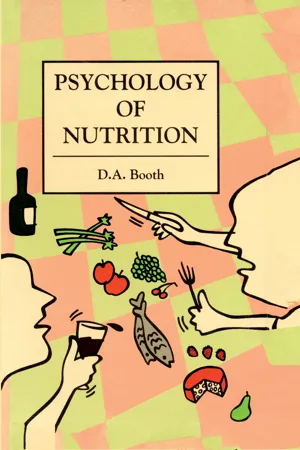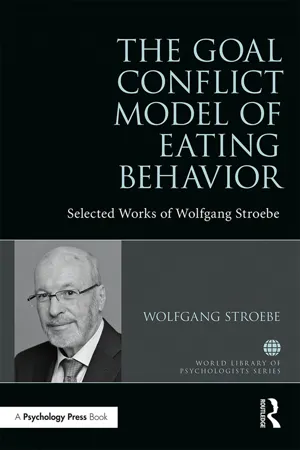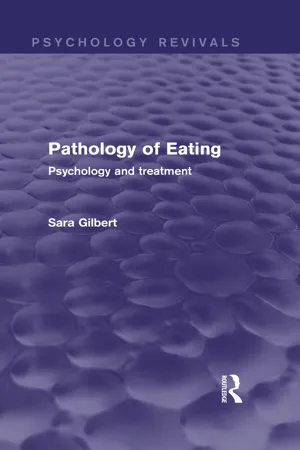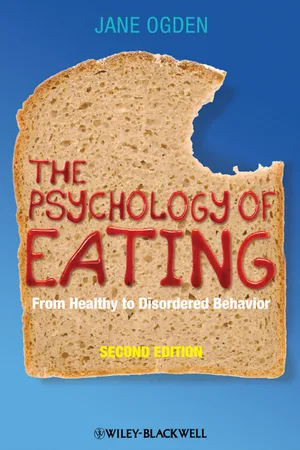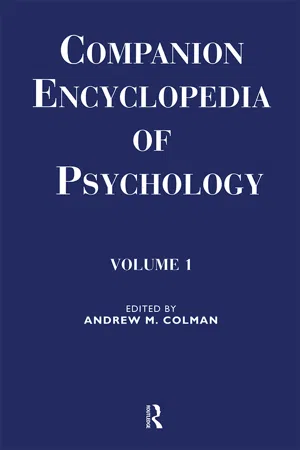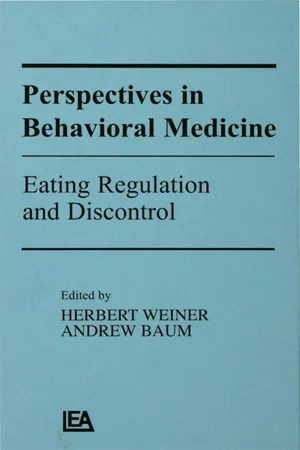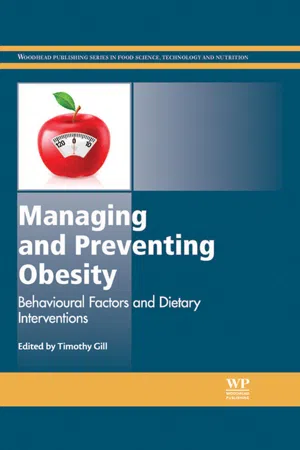Psychology
Psychology behind Dieting
The psychology behind dieting explores the mental and emotional factors that influence people's eating behaviors and weight management. It encompasses understanding motivations, self-control, body image, and the impact of social and environmental cues on food choices. This field of study aims to develop effective strategies for promoting healthy eating habits and sustainable weight loss.
Written by Perlego with AI-assistance
Related key terms
11 Key excerpts on "Psychology behind Dieting"
- eBook - ePub
- David Booth(Author)
- 2016(Publication Date)
- Taylor & Francis(Publisher)
There is therefore an economically powerful and socially pervasive cult that has institutionalized an ideal of slimness which is beyond that attainable by the majority of adults. This worship of scrawniness supports and is supported by a diet industry and dieting myths, rituals, values and moods that are all the more seductive for their informality, discoordination and uselessness. To top all that, official medical campaigns help put chubby people as well as the grossly fat into fear for their health and their lives.Dieting
Dieting then is a collection of practices centred on attempts to eat less in order to be thinner. Dieters feel that they are regarded as fat and so try to do things that seem suitable to helping them eat less and lose weight, even though they may not in fact get slimmer or keep off any weight that they do lose.Thus there are two presuppositions to dieting. One is that there is a desirable leaner shape and/or a lower weight. The other is that there is an appropriate sort of eating to attain that shape or weight.These conceptions give rise to endless discussion because they raise issues that have yet to be resolved to general satisfaction among those who are expected to have expertise in such matters. This is largely because both the assumptions behind dieting involve scientific matters to which the relevant research discipline has yet to be applied. Why people want to lose weight and the influences on whatever eating practices are conducive to effective weight control are psychological facts. Yet these facts seem intuitively obvious to members of the same culture – above all, to those with expertise in dietary health or in food design. Hence, even when psychology is seen as relevant to the motivation to lose weight and the determinants of food choice, it remains difficult to grasp the scientific requirements for finding out, first, how to motivate slimming selectively for health and, secondly, which food choices are least fattening.As a result, several false starts down the road to reduction of obesity by eating less have been made by psychological scientists and practitioners as well as by educators, nutritionists, physicians and diet-product developers.The Psychology of Obesity
At this point in history in more affluent countries, most fat people are liable also to be unsuccessful dieters. Psychological research into human obesity should therefore centre on dieting. The key job is to elucidate what maintains unhealthy adiposity that goes on in the mind of the dieter, in relation to the body and the culture. - eBook - ePub
The Goal Conflict Model of Eating Behavior
Selected Works of Wolfgang Stroebe
- Wolfgang Stroebe(Author)
- 2017(Publication Date)
- Routledge(Publisher)
Mechanism of dieting successPassage contains an image
Processes of self-regulatory success in restrained eating6Healthy cognitionEsther K. Papies, Wolfgang Stroebe and Henk AartsThe ability to overcome one’s first impulses in order to strive for a more abstract, higher order goal is crucial in many domains of life. Such efforts have been termed self-control , or self-regulation , and attracted a large amount of research from psychologists (Vohs & Baumeister, 2004). What seems to be crucial in order to ward off attractive temptations that constitute a challenge for self-regulation is to keep in mind the goal one eventually wants to reach (Shah, Friedman, & Kruglanski, 2002). It is easier, for example, to resist buying an attractive-looking pair of shoes if you remind yourself of the fancy car you are saving for, and the dieter may be able to resist a tempting dessert only by thinking about his or her desire for a slim figure. At the same time, those who spontaneously “forget” that they were on a diet while standing in front of the buffet are likely to succumb to the temptations of tasty food and will be less successful in their dieting attempts. In the present research, we address this issue by examining the impact of temptation cues on the accessibility of the overriding goal, and we will show how this is related to actual success in goal pursuit.An area in which self-regulation seems to be especially difficult for many people is the domain of eating and dieting behavior. The prevalence of overweight and obesity is constantly increasing in Western societies (Flegal, 2005), and dieting is a very popular means of weight regulation (Kruger, Galuska, Serdula, & Jones, 2004). However, most people find it difficult to maintain a successful weight loss diet. Only a small minority of dieters are able to reduce their body weight in the long term while the majority at least regain the weight initially lost through dieting (Jeffery et al., 2000; Mann et al., 2007). Thus, trying to diet seems to be a largely ineffective strategy for reducing one’s body weight. - eBook - ePub
Pathology of Eating (Psychology Revivals)
Psychology and Treatment
- Sara Gilbert(Author)
- 2013(Publication Date)
- Routledge(Publisher)
In their programme at the University of Cincinnati, they prepare patients for a realistic appraisal of the likely effect of dieting through teaching about obesity, and the effects of diet on metabolism, and through discussion of previous diet experiences. Each person plays a major part in selecting her own goals based on these discussions, goals which may include restricting their diet to a greater or lesser degree. The Wooleys have arrived at this form of individual treatment through the experience of watching the failure of many diet attempts and the pain thus caused. What then are the psychological effects of dieting and of weight loss? Psychological effects of dieting and weight loss There can be little doubt that unsuccessful dieting has negative effects on mood for many people (see also page 90). Halmi and her colleagues (1980) have described the retrospective reports of patients who had undergone surgery for their obesity. The majority of these people claimed to have been preoccupied with food, irritable, anxious and depressed, whenever they had attempted to diet in the past. The diets were of course by the very nature of the subjects questioned, unsuccessful, and the same people reported less intense symptoms after surgery, many of them feeling elated and self-confident. However, the effect of dieting on emotions is not uniform across all people. In our own outpatient study patients were asked to rate their moods on the Leeds scale for depression and anxiety (Snaith et al., 1976) at monthly intervals. It was remarkable that while for some people weight loss bore a linear relationship to anxiety, for some it bore a relationship to depression, for some it bore a relationship to both, while for others there was no relationship at all (unpublished data) - eBook - ePub
The Psychology of Eating
From Healthy to Disordered Behavior
- Jane Ogden(Author)
- 2011(Publication Date)
- Wiley-Blackwell(Publisher)
Many men and women are dissatisfied with their body size and shape. Men tend to take up exercise, but for women body dissatisfaction translates into dieting. The translation of body dissatisfaction into dieting is facilitated by the dieting industry, which perpetuates the belief that thinness is the desired state. Further, the dieting industry encourages the belief that body size and shape can be changed, and then offers dieting as the means through which to change it. However, although dieting aims to reduce food intake and cause subsequent weight loss, much research indicates that dieting causes episodes of overeating. This research has been inspired by restraint theory and has highlighted disinhibitory behavior as a consequence of attempts to impose cognitive limits on food intake. Explanations of disinhibition include the boundary model of overeating, which emphasizes the dieters’ cognitive limits, changes in both cognition and mood, a paradoxical response to denial, and escape theory, which highlights the role of self-awareness. Research has also drawn parallels between eating behavior and addictive behaviors. Overeating is not the only consequence of dieting; attempted and actual food restriction can also lead to a preoccupation with food, lowered mood, and feelings of being out of control. Dieting has also been implicated in weight changes in terms of weight variability, eating disorders, and obesity. However, there are problems with restraint theory, with researchers questioning the link between dieting and overeating, the validity of restraint measures, and the nature of dieting itself. It would seem that dieting does not always lead to overeating, and that some measures of restraint specifically select those dieters with a tendency to overeat. It is most likely that there are some dieters who are always successful in their attempts to eat less, but that there is also a majority of dieters who fluctuate between episodes of undereating and episodes of disinhibitory behavior.Towards an integrated model of diet
Many individuals wish to choose a healthy diet. Food choice, however, takes place within the context of meanings associated with food and size, which can result in weight concern. In particular, women feel dissatisfied with their body size and shape and this dissatisfaction often results in dieting. But the goal of dieting is often sabotaged by the psychological consequences of imposing limits upon food intake, and attempts to choose a healthy diet become more problematic. Eating is also associated with other more extreme problems. Obesity is one of these problems and is the focus of the next chapter. - eBook - ePub
Therapy for Eating Disorders
Theory, Research & Practice
- Sara Gilbert(Author)
- 2013(Publication Date)
- SAGE Publications Ltd(Publisher)
7 Nutritional Aspects of Helping the Client with an Eating DisorderThe cognitive view of eating disorders encompasses the notion that they are maintained in part by the effects of dieting and bingeing. Therefore, an important aspect of therapy is for both therapist and client to be able to understand and deal with the links between emotions and eating and misconceptions about weight loss and gain.There is so much publicity given to the topic of dieting and weight loss that it is easy to assume greater knowledge on the part of the person who has an eating disorder than she actually has. Many clients have spent several years worrying about dieting or concentrating on increasing degrees of self-deprivation and some will have absorbed a great deal of apparently educative material: healthy eating pamphlets and cook books, magazines and articles devoted to slimming success stories, in addition to numerous television programmes about obesity and dieting. Others have gained their information largely from discussions with other women: school friends, family, colleagues at work. Whether overweight, normal weight or underweight, all clients with eating disorders are likely to have mistaken beliefs and inadequate knowledge both about good nutrition and about how weight is lost or gained.Some therapists hold the view that discussion of food issues is irrelevant to the client’s problems, and that the desire on the part of the client to discuss details of weight and eating merely serves as a distraction from the ‘real’ issues, be they personal or interpersonal. There is therefore a strict division between the role of the psychotherapist or counsellor and the dietician or nutritionist.1 - eBook - ePub
Food and Health in Early Childhood
A Holistic Approach
- Deborah Albon, Penny Mukherji(Authors)
- 2008(Publication Date)
- SAGE Publications Ltd(Publisher)
Chapter 5 Food, Eating and Emotion The eating behaviour of children (and adults) is influenced by a complex set of interacting factors. This chapter looks at the physiological processes and psychological underpinnings of hunger and how early childhood experiences, especially early attachment relationships, may have an effect on subsequent eating behaviour. Infant feeding and eating difficulties are discussed, together with the role of early years practitioners in promoting positive experiences for children regarding food and meal-times. This chapter looks at food and eating from an individual perspective and begins with a look at some of the underlying physiological processes that influence eating behaviour. We will emphasize that purely physiological explanations do not explain why it is that we eat when we are not hungry and we explore some psychological explanations, including psychoanalytic explanations, that look at underlying attachment processes. The following key areas are explored. The physiological processes underlying eating behaviour Impulsivity and eating behaviour Stress, depression and eating The influence of early feeding experiences Feeding and eating disorders Promoting positive attitudes towards food in early years settings. The physiological processes underlying eating behaviour Homeostasis Hunger and thirst are considered to be physiological drives, and are related to the concept of homeostasis. According to Cardwell et al. (1998) the term ‘homeostasis’ was first used by Cannon in 1932, to describe the mechanism by which our bodies try to keep internal processes in balance. The body works best when there is a correct balance of chemicals, nutrients, oxygen and water available at the correct temperature. If, for example, the proportion of water changes just a few per cent, the brain would not function and a change in body temperature of more than a few degrees would result in death - eBook - ePub
- Lucy Yardley, Lucy Yardley(Authors)
- 2013(Publication Date)
- Routledge(Publisher)
The data used so far in this chapter has taken the form of theoretical discourse. Such discourse is developed by ‘experts’ and is gradually transformed into the accepted truths about diet. Perhaps, however, the way in which non-experts understand diet and eating behaviour is different. It is possible that such expert accounts differ from those provided by the lay person, who may understand diet using a different model of the individual. An examination of women’s own accounts of their eating behaviour suggests that this is not the case: parallel models of diet can be found in expert and lay accounts. The interview data from a study of twenty-five women who were attempting to lose weight suggests that the experts’ discourse about diet and its focus on self-control finds reflection in women’s own accounts (Ogden 1992). The results from this study indicated that the women described their dieting behaviour in terms of the impact on their family life, a preoccupation with food and weight, and changes in mood. However, the concept of self-control transcended these themes. For example, when describing how she had prepared a meal for her family, one woman said, ‘I did not want to give in, but I felt that after preparing a three-course meal for everyone else, the least I could do was enjoy my efforts.’ The sense of not giving in suggests an attempt to impose control over her eating. In terms of the preoccupation with food, a woman said, ‘Why should I deprive myself of nice food?’, and another said, ‘Now that I’ve eaten that, I might as well give in to all the drives to eat.’ Such statements again reflect a sense of self-control and a feeling that eating reflects a breakdown in this control. In terms of mood, one woman said that she was ‘depressed that something as simple as eating cannot be controlled’, and likewise this role of self-control was also apparent in the women’s negative descriptions of themselves, with a woman saying, ‘I’m just totally hopeless and weak, and though I hate being fat I just don’t have the willpower to do anything about it.’ Accordingly, theoretical discourses of diet describe eating behaviour in terms of self-control and conceptualise a late twentieth-century individual who is intra-active. In parallel, lay discourses illustrate a similar emphasis on self-control and describe a comparable model of the individual.The lay—expert boundary
Models of communication within both psychological and sociological theory divide beliefs and theories into lay versus expert accounts. Lay accounts are regarded as varied and as corresponding to individuals’ personal experiences, and expert theories are regarded as a product of study, knowledge and evidence. However, both lay and expert theories of diet describe a similar model of the individual who is self-controlling. Why are there such parallels between these two different types of data? One answer is to conceptualise expert accounts as the origin of models which permeate down to lay individuals. Alternatively, it could be argued that expert accounts are derived from an inductive analysis of lay theories. Accordingly, lay theories form the basis of expert knowledge. However, perhaps the boundary between lay and expert theories is itself constructed by theories of knowledge which differentiate between lay accounts (beliefs) and experts’ accounts (knowledge). In line with this, rather than privileging either of these accounts, perhaps these two versions of knowledge are not only constructed as divided by knowledge, but are mutually constructive as knowledge. Accordingly, the lay—expert boundary becomes permeable and the problem of similarity is solved. - eBook - ePub
Companion Encyclopedia of Psychology
Volume One
- Andrew M. Colman(Author)
- 2018(Publication Date)
- Routledge(Publisher)
Figure 1 emphasizes the way in which food consumption can be broken down into specific components (nutrient selection, micro-structure of behaviour, etc.) so as to diagnose the effects of various factors on the expression of appetite. The pattern of eating provides a sensitive way of assessing the impact of physiological or environmental features (Blundell, 1984). Of course, for humans, the subjective experiences or cognitions surrounding eating can similarly be regarded as being constructed out of physiological signals and the characteristics of the external environment (Blundell, 1981). Reynolds (1976) has referred to these cognitions as culturally defined knowledge entering the mind to give contours to the world, thus making sense out of physiological functioning.As a first stage in understanding appetite, the interactional concept is important, for it lets us know that the phenomenon is not controlled by a single dominant cause. The analysis of appetite will therefore require an appreciation on the interrelationships among a number of factors from quite separate domains. This approach is equally important for the study of appetite in animals and in humans. However, for the investigation of human appetite a further conceptual scheme is appropriate.Appetite and Body Weight Regulation
It has been noted above that appetite can be considered a phenomenon that links biological happenings (under the skin) with environmental happenings (beyond the skin). This interaction has implications for the regulation of body weight. This is inevitable because energy balance is dependent upon the relationship between energy intake (food consumption) and energy expenditure (physical activity, energy used to maintain bodily processes, and energy involved in the processing and storage of consumed food). A positive energy balance (intake greater than expenditure) means that body weight will be gained, whereas a negative energy balance leads to weight loss. Any factors that influence appetite will naturally adjust energy intake, and this will alter energy balance. It is normally considered that body weight is a variable subject to homeostatic control. That is, body weight is biologically regulated. However, because appetite is also influenced by environmental factors, an examination of the principles of weight regulation should tell us something about the strength of biological and environmental influences on appetite. What basic principles can be uncovered? - eBook - ePub
Perspectives in Behavioral Medicine
Eating Regulation and Discontrol
- Herbert Weiner, , Andrew S. Baum, (Authors)
- 2013(Publication Date)
- Psychology Press(Publisher)
As with social influence or externality, we do not know whether stress-induced eating ever achieves the regularity required to produce a massive increase in caloric intake. And again, we do not know whether even a massive increase in intake will eventuate in significant weight gain, given the possible countervailing pressures that physiology may bring to bear. As before, we must be aware of the possibility that the vulnerability of some people to stress-induced eating may be yet another mechanism in the armamentarium of set-point defense. In our laboratory, it is dieters who show greater emotional response to stressors and who are more likely to eat in response to stress (Herman & Polivy, 1975; Polivy, Herman, & Warsh, 1978). Might these aberrations be defenses intent on restoring weight to its set-point level?We (Polivy & Herman, 1976) conducted one study in which we demonstrated that clinical depression was associated with significant weight gain in dieters. However, our interpretation was that dieters, when they become depressed, may stop dieting as assiduously as before. The net result may be that they will regain previously lost weight. This is a long way from an explanation of obesity.CONCLUSIONSI have emphasized the gaps in our knowledge about the role of social and psychological factors in obesity. Indeed, I have argued that we are not in a position to grant such factors any definite causal role in the development of obesity. Most of my arguments have been premised on the assumption that physiological theories of obesity are adequate to account for it. Social and psychological factors may act as agents of physiology, serving to help achieve or restore the elevated weight that is dictated by set-point considerations.This assumption is unabashedly reductionistic. It is easy to grant, for it puts me in the company of “real” scientists who are sure of the value of their approach. Unfortunately, though, this assumption, like the old psychoanalytic assumptions and the newer social psychological assumptions, is not as easy to defend as one would hope. The fact of the matter is that we do not really know why people get fat. It is certainly arguable that some of them are destined, biologically, to be fat. Among lower species, it would not surprise me if virtually all instances of obesity were expressions of genetic purpose. [There are a few interesting sorts of overeating that seem superficially to depart from the strict genetic view, such as cafeteria-feeding-induced obesity (see Sclafani, 1980); but even such examples can probably be reinterpreted, with a little ingenuity, within a framework of biological weight regulation.] - eBook - ePub
Managing and Preventing Obesity
Behavioural Factors and Dietary Interventions
- Timothy Gill(Author)
- 2014(Publication Date)
- Woodhead Publishing(Publisher)
et al. , 2005). We cannot review all of these literatures here, but will give a brief summary of the salient findings.12.6.1 The psychology of the person
We have seen that obese and overweight people seem to respond more strongly to food cues, as do restrained eaters. There is also evidence that trait impulsivity is similarly predictive of a cognitive bias toward food cues (Hou et al. , 2011), is associated with increases in appetite ratings and desired portion sizes after food-cue exposure (Tetley et al. , 2010), and is associated with weight gain over a 10-year period and with a tendency to give in to temptation (Sutin et al. , 2013).Other aspects of the person, such as memory about recent eating and beliefs about the food that one has eaten or is about to eat, have also been shown to influence food intake (Higgs, 2008 ). Moreover, lesions to the hippocampus, which is the area of the brain thought to be responsible for learning and memory, produce excessive eating in the lesioned animals (Higgs, 2008 ).It is clear that visceral factors such as hunger due to food deprivation affect people’s behaviors, and as such factors become more intense or increase, they focus behavior more and more toward the relief of visceral discomfort (Loewenstein, 1996 ). Thus, food deprivation has been shown to affect the reinforcing value of food and to influence intake (Epstein and Leddy, 2006 ), as well as to shift people’s food choices from preferred, palatable foods to anything that is immediately available to be eaten (Hoefling and Strack, 2010 ). Simply anticipating being food deprived by having to go on a diet later produces overeating in restrained eaters (Urbszat et al. , 2002). Mere perceived deprivation, or the feeling that one has been deprived or cannot eat as much as one would like, seems to be as influential as actual food deprivation. This perception correlates strongly with restrained eating and susceptibility to weight gain (Markowitz et al. - eBook - ePub
- Jane Ogden(Author)
- 2023(Publication Date)
- Routledge(Publisher)
Ogden, 1992 ). The results from this study indicated that the women described their dieting behaviour in terms of the impact on their family life, a preoccupation with food and weight and changes in mood. However, the concept of self-control transcended these themes. For example, when describing how she had prepared a meal for her family, one woman said, ‘I did not want to give in, but I felt that after preparing a three-course meal for everyone else, the least I could do was enjoy my efforts’. The sense of not giving in suggests an attempt to impose control over her eating. In terms of the preoccupation with food, one woman said ‘Why should I deprive myself of nice food?’ and another said ‘Now that I’ve eaten that I might as well give in to all the drives to eat’. Such statements again illustrate a sense of self-control and a feeling that eating reflects a break-down in this control. In terms of mood, one woman said that she was ‘depressed that something as simple as eating cannot be controlled’. Likewise this role of self-control was also apparent in the women’s negative descriptions of themselves, with one woman saying, ‘I’m just totally hope-less and weak, and though I hate being fat I just don’t have the willpower to do anything about it’. Contemporary diet-related texts describe eating behaviour in terms of self-control and conceptualise a late twentiethcentury individual who is intra-active. In parallel, lay discourses illustrate a similar emphasis on self-control and describe a comparable model of the individual.In summary, across a number of apparently distinct psychological texts the eating individual of the late twentieth century is constructed as a self-controlling self. This individual is also described as reflexive and intra-active. Sociological theories of eating and food illustrate a similar shift in their model of the individual.
Index pages curate the most relevant extracts from our library of academic textbooks. They’ve been created using an in-house natural language model (NLM), each adding context and meaning to key research topics.
